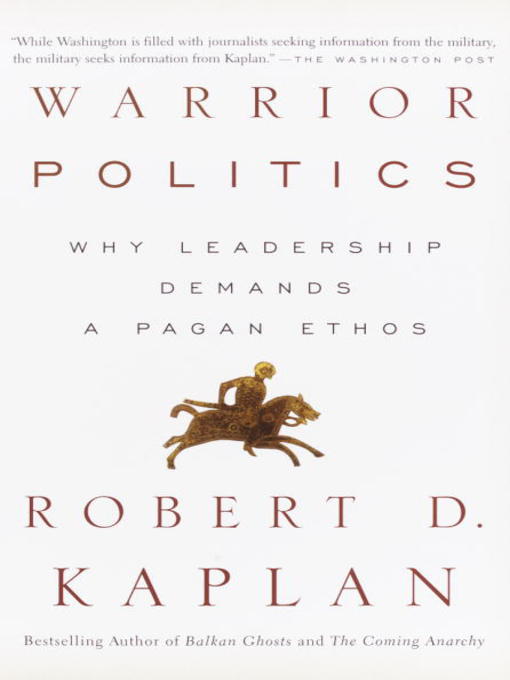
Warrior Politics
Why Leadership Demands a Pagan Ethos
کتاب های مرتبط
- اطلاعات
- نقد و بررسی
- دیدگاه کاربران
نقد و بررسی

April 1, 2002
Using Cicero's letters to his good friend Atticus, among other sources, Everitt recreates the fascinating world of political intrigue, sexual decadence and civil unrest of Republican Rome. Against this backdrop, he offers a lively chronicle of Cicero's life. Best known as Rome's finest orator and rhetorician, Cicero (103 –43 B.C.) situated himself at the center of Roman politics. By the time he was 30, Cicero became a Roman senator, and 10 years later he was consul. Opposing Julius Caesar and his attempt to form a new Roman government, Cicero remained a thorn in Caesar's side until the emperor's assassination. Cicero supported Pompey's attempts during Caesar's reign to bring Rome back to republicanism. Along the way, Cicero put down conspiracies, won acquittal for a man convicted of parricide, challenged the dictator Sulla with powerful rhetoric about the decadence of Sulla's regime and wrote philosophical treatises. Everitt deftly shows how Cicero used his oratorical skills to argue circles around his opponents. More important, Everitt portrays Cicero as a man born at the wrong time. While Cicero vainly tried to find better men to run government and better laws to keep them in order, Republican Rome was falling down around him, never to return to the glory of Cicero's youth. A first-rate complement to Elizabeth Rawson's Cicero
or T.N. Mitchell's monumental two-volume biography, Everitt's first book is a brilliant study that captures Cicero's internal struggles and insecurities as well as his external political successes. Maps.

November 26, 2001
Years of reporting from combat zones in Bosnia, Uganda, the Sudan, Sierra Leone, Pakistan, Ethiopia and Eritrea have convinced Kaplan (Balkan Ghosts, The Coming Anarchy) that Thucydides and Sun-Tzu are still right on the money when they wrote that war is not an aberration and that civilization can repress barbarism but cannot eradicate it. Reminding readers that "The greater the disregard of history, the greater the delusions regarding the future," Kaplan conducts a brisk tour through the works of Machiavelli, Malthus and Hobbes, among others, to support his advocacy of foreign policy based on the morality of results rather than good intentions. From those classics, he extracts historical models and rationales for exploiting military might, stealth, cunning and what he dubs "anxious foresight" (which some may regard as pessimism based on disasters past) in order to lead, fight and bring adversaries to their knees should they challenge the prevailing balance of power. He also adapts this model to business, exploring the ways modern-day CEOs can benefit from history's lessons. Kaplan's discussion of the world's breeding grounds for rogue warriors out to disrupt daily life in bizarre new ways will strike a chord with most readers, as will his recounting of the brilliant statesmanship of Churchill and Roosevelt during World War II. Some readers, however, may take exception to the potshots Kaplan aims at (unnamed) media personalities and human rights advocates. This is a provocative, smart and polemical work that will stimulate lively discussion. Agents, Brandt and Brandt. (Jan.)Forecast:Kaplan's credentials, combined with his call for a strong and unambiguous foreign policy, should draw attention. Blurbs from Henry Kissinger and former Secretary of Defense William J. Perry will help.

February 1, 2002
In this timely and controversial book, the journalist and popular historian best known for Balkan Ghosts and, more recently, The Coming Anarchy blends his experience as a combat reporter with a review of those political philosophers who address matters of war, strategy, and morality. From Sun Tzu through Machiavelli, Hobbes, and Kant, Kaplan finds that war and the preparation for war are central to human history. He describes the emergence of a new warrior class in the world and sees some form of "loose world governance" as an inevitable vehicle for security. His argument is ably illustrated with examples from ancient history, World War II, and the Cold War. His comparison of the United States in 2001 with the complacent Roman Empire will be a wake-up call for many readers. Kaplan may not be especially optimistic about the future, but he finds hope in the examples of historical figures like Pericles, Tiberius, and Churchill. His philosophical polemic is well worth reading in these anxious times. Another timely book by Kaplan, Soldiers of God: With Islamic Warriors in Afhanistan and Pakistan (Vintage, 2001), has just been reissued. [Previewed in Prepub Alert, LJ 9/1/01.] Thomas A. Karel, Franklin & Marshall Coll. Lib., Lancaster, PA
Copyright 2001 Library Journal, LLC Used with permission.

December 1, 2001
Kaplan looks to ancient philosophers and military strategists for ageless wisdom that can be applied to modern geopolitics. The end of the cold war and the proliferation of modern technology threaten to create such complacency that world leaders miss the significance of "nasty little wars in anarchic corners of the globe." Indeed, Kaplan mentions the likelihood of expeditions to apprehend the likes of Osama bin Laden. Integrating classic and contemporary scholarship, the author argues that the ills of the twentieth century are "less unique than we think" and draws parallels between the complacency of Rome at its height and that of the U.S. Kaplan argues that power and affluence can blind a nation to the harsh realities of life, the driving force of the pagan notion of self-interest. Citing philosophers from Sun-Tzu to Machiavelli, the author shows the value of ancient insights into human nature in formulating international policy. This insightful, timely book will have broad appeal in the wake of terrorist attacks on the U.S.(Reprinted with permission of Booklist, copyright 2001, American Library Association.)

























دیدگاه کاربران